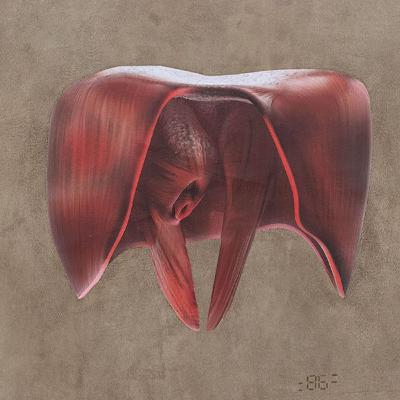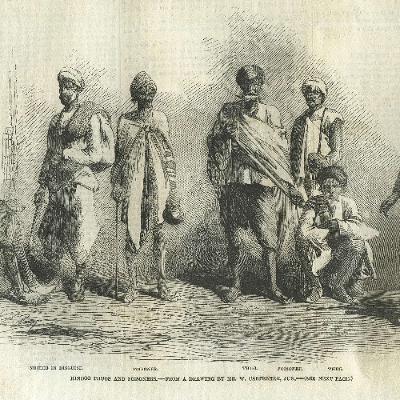Discover SynTalk
SynTalk

203 Episodes
Reverse
Has it always been the Anthropocene? Do you care about the ‘powerless’ Nicobar? How old is biodiversity? Why does anyone want to be a conservationist? What is the kind of variety that we wish to preserve? What is a unit of diversity? Do different parts of the world think differently today about the ‘species vs habitat’ question? Is agency distributed throughout nature? What did Tibbles do? Are there variations even within individuals (of a taxonomic group) in an environment? What purpose do sacred groves serve? Is conservation always great for local communities? Must conservation efforts also be calibrated? Can diversity be ‘understood’ via experience? How do diversification, adaptation and extinction contribute to evolution? Do the (internal) processes of organic life themselves lead to diversity? What is it like to lose things without knowing about them? How do differing aesthetic and moral impulses influence us? Are you afraid of change? Do you like manicured lawns? What does natural selection act on? How do we classify the world? What choices do we have? What is diversity for? &, could one even think a 1000 years into the future? SynTalk thinks about these & more questions using ideas from evolutionary biology (Dr. Anand Krishnan, JNCASR, Bangalore), philosophy & biology (Prof. Sahotra Sarkar, UT Austin, Austin) & conservation studies (Dr. Pankaj Sekhsaria, IIT Bombay, Mumbai). Listen in...
Are our brains log-normal? Why is breathing rhythmic? Why is there a hum in the universe? Do our hearts beat chaotically? Are the (stock) markets random and ‘unbounded’? What is a market? How is Mercury perturbed? What has sleep-wake cycles? Must you go up and down with the sun? What causes whirlpools in a smooth flowing river? Where do rhythms reside? Is there an equivalent of homeostasis in the markets? What is your sigh rate just now? Are you depressed? Could you move fast, vocalize, eat and breathe at the same time? Why do we hyperventilate when we are anxious? Is there phase lock-in between (say) moving and (quantized) breathing? What role do feedback loops or self organization play in regulating complex systems? Do risks become more systemic in a complex & connected world? Why are flight transportation systems more easily perturbed than bio-physical systems? In general, are emergent systems less easily perturbed? How is degeneracy different from redundancy? How do certain monks (?) go without breathing for a few hours? Do order and disorder lie on the same continuum? &, must we always build bottom-up? SynTalk thinks about these & more questions using ideas from neuroscience (Dr. Sufyan Ashhad, NCBS, Bangalore), econophysics (Prof. Anirban Chakraborti, JNU, New Delhi) & philosophy (Rev. Fr. Dr. Mathew Chandrankunnel, JIS University, Kolkata). Listen in...
Are you a born criminal? Is genocide ever justified? Is meritocracy a ‘garbage’ concept? What are the entitlements that you have by virtue of being a human being? Do rights exist because the State exists, & vice versa? Are rights sometimes anti norms? Do nomadic and sedentary societies think differently of rights? Are rights always a product of struggle? Are you 42 and a communist? Are all rights inter-related? Can the right to dignity be limited? What gets transmitted across generations? Are the normative social structures of the past in our prefrontal cortex today? Does reservation come under the framework of equality? What are a prisoner’s rights? Does it suit us to have certain sections of people stigmatised? Must social, political & economic rights go hand in hand? Can societies be changed without economic incentives? Is West Africa still scarred by slave trade? Can historical recompensation be done forever? Do you have a present bias? When are gender points a good idea? What makes rights effective - is this scale dependent? Why is Geneva Convention not always enforceable? Which rights are non-derogable? &, what are the rights of the next generation today? SynTalk thinks about these & more questions using ideas from economics (Prof. Sujoy Chakravarty, JNU, New Delhi), history (Prof. Ajay Dandekar, Shiv Nadar University, Delhi-NCR) & law (Prof. Arvind Narrain, NLSIU, Bangalore). Listen in...
How many meals do you have time for? Why do sweets make you happy? Does fruit sugar (fructose) need insulin? Why does sugar spike? Are oranges and grapes differently sweet? Has sugar always been a transnational commodity? How did Europe get sugar? How did the first sweet shops come up? How did we end up milking animals? Is time the fourth factor in nutrition? Are apples autochthonously sweet? Do sweet making techniques travel easily? What travels first – people or food? What does grinding do to grains? Where do you get your samosas and croissants? Does your tea have blood in it? Is your diet carbohydrate heavy? Might you crave ‘more’ food if you consume less sweets? What has the relatively recent non-seasonal abundance done to human bodies? Have our metabolic systems evolved to fight abundance as well as scarcity? Do all blood pressure patients need to restrict salt? How important is the sensation of sweetness? What exactly do sugar-free sweets do? What is monk fruit’s future? Is greater industrialization of our food systems inevitable? &, would sweets continue to embody the spirit of indulgence (& excess) in the future? SynTalk thinks about these & more questions using ideas from endocrinology (Dr. Hemraj B. Chandalia, Jaslok Hospital, Mumbai), culinary anthropology (Dr. Kurush F. Dalal, Gyaan Factory, Mumbai) & sociology (Dr. Ishita Dey, South Asian University (SAU), New Delhi). Listen in...
How do you look at women? Do Goddesses follow Gods? Is the ultimate Reality an ‘It’? What’s the relationship between matter and energy? Are dualities necessarily conflictual? Is Eve inferior to Adam? Where do the Cosmos and the Body intersect? How did the sacred geography of the subcontinent evolve? Do Goddesses have an influence on the lives of men (& kings) & women? Where/how did patriarchy exist? How did Ramabai become Pandita Ramabai? What did the colonial encounter do to the archetypes of Goddesses? How did the early literary women appropriate the Goddesses? Is (only) education responsible for empowerment? Is Vishnu’s primal inner energy essentially female? Who is capable of hedonistic bloodlust? What invoked the wrath of Nanda Devi? Are male and female in a union like speech and meaning? What is evil? Or, dirty? Did women have a voice in pre-Colonial ‘India’? What are your models for feminism? How do courtesans become poet saints and Goddesses? How did the tribal women of India ‘transform a priest’? What might indigenous feminism look like? &, what is the future of the several goddesses & the little (folk) traditions? SynTalk thinks about these & more questions using ideas from cultural studies (Prof. Sachidananda Mohanty, IIAS, Shimla), Dr. M.D. Muthukumaraswamy (folklore studies, Chennai) & Sanskrit studies (Dr. Bihani Sarkar, Lancaster University, Lancaster). Listen in...
Do you have neanderthal DNA? Is your body your identity? What makes the knowledge of death possible when no one alive has experienced it first hand? How does dying feel? What are your schemas for understanding death? Is death the default, & it is life that happens occasionally? Does a cell know when it ought to die? When is an organism dead? When can we not dream? Can (certain) tissues and organs regenerate? What are the biochemical reactions a response to? What does oxygen do? Does the concept of death make control over others possible? Can we reverse death itself? What is the 'location' of a person? Do all cells come from other living cells? Or, can cells be created artificially from scratch? Is the body inferior to atman? Intrinsically, is everything conscious? Why do we see matter around if it's all one consciousness? Is Higg's boson dead? Do the cells need to divide to avoid death? Is dying like falling in deep sleep, & do we therefore die everyday? How does structure and order reproduce? What did you inherit from your mother at birth? Can dead mammoths be resurrected? &, will we have the power to create varied artificial life in the future with genome writing? SynTalk thinks about these & more questions using ideas from philosophy of science (Prof. G. Nagarjuna, IISER, Pune), theology (Swami Narasimhananda, Ramakrishna Mission Sevashrama, Kozhikode), & genomic sciences (Prof. Binay Panda, JNU, New Delhi).
Are you a lobby strategist? Do you negotiate with yourself? Which taste group do you belong to? What are you allowed to see? Do you pay to publish? Do the algorithms that serve you change with you? How are counterpublics generated? Is society constantly transforming itself? What role does capital play? Does media influence human rationality? Are you able to tell real discourse and propaganda apart? Was there ‘public opinion’ (say) a 1000 years ago? Does public sphere have capitalistic roots? What happens to niche ideas in an information supermarket? Are newspapers opinion ‘takers’? Have most modern societies moved from being axiomatic to algorithmic? Can one have societies without a moral discourse? What happens to our base instincts? Do you have the ability of have your own individual opinion? However, are niche morals undesirable? Do ads serve a symbolic norm-making function as well? ‘How’ do you go after your ‘target’ audience? Is it alright if mass media becomes ‘hyper personal’? Is the public just a sum of the all the individual echo chambers? &, what is the kind of public that we want? SynTalk thinks about these & more questions using ideas from philosophy (Dr. Muzaffar Ali Malla, Islamic University of Science and Technology (IUST), Avantipura (J&K)), social sciences (Prof. Narendar Pani, NIAS, Bangalore), & media studies (Dr. Vibodh Parthasarathi, Jamia Millia Islamia, Delhi). Listen in...
What do you expect to see on windy islands? Can you soar? Are there a finite number of ways of flying? Did we glide before flying? Do birds & insects fly like planes, & vice versa? How are the lift-off forces and moments generated? Was the Wright Flyer I (which made the first sustained manned flight in 1903) actually a very bad design? Do flies fly merely by seeing? Are wings thermo-regulatory devices? Why has flying evolved several times across different species? How many times of its own weight can flying structures take? How should flying carpets be made? Does it matter to the moth what the value of ‘g’ is? How might dragonfly wingspan change with atmospheric oxygen content? Can airplanes fly like sharks swim? Why shiver? How are/would the helicopters that fly on Mars (be) different? How will a balloon inflate on Venus? Are biological flyers far more efficient than the human engineered ones – how? Do birds and insects of the same size fly similarly? How are unmanned and manned systems different? Why don’t we have faster commercial flights (given they are possible)? Can one expect to see new ways and manners of flying? Will we ‘fly’ to Mars at some point? &, is there still a lot of ground to cover? SynTalk thinks about these & more questions using ideas from aeronautical engineering (Prof. Rajkumar Pant, IIT Bombay, Mumbai), & neurobiology & physiology (Prof. Sanjay Sane, NCBS, Bangalore). Listen in...
How do the disposable get marked out? Which institutions have cognitive control over you? How do you develop railways in Argentina? Who changes institutions? Is it always from ‘within’? Do institutions help us with the ‘higher order’ decisions? Are military, markets, prisons, families, religions, borders, languages, & villages coercive in the same way? Are prisons (in reality) chaotic? What’s the price of joining an institution? Is there conformity of opinion around you? Do religions evolve? How do you think of the family? Do institutionalization and socialization go hand in hand? ‘When’ do markets need to be regulated? Are cryptocurrencies really a counter-current? Does our continuous search for meaning gives Religion its power? Do universities live longer than political organizations? What are universities from the perspective of the dropout? Does the world need one anchor currency? Can algorithms be inclusive of local issues? Have institutions, thus far, been spatially bound? What would planetary scale institutions look like in the future? ‘How’ are the marginal voices to be heard? &, are nation states the best institutional form for the modern world? SynTalk thinks about these & more questions using ideas from sociology (Prof. Mahuya Bandyopadhyay, IIT Delhi, New Delhi), economics (Prof. A. Damodaran, IIM Bangalore, Bangalore), & history (Prof. Srinath Raghavan, Ashoka University, Delhi (NCR)). Listen in...
How ‘deep’ would a 1,000 years be? Is all space place? How do use, identity, value, law, power, or (‘imaginative’) memory hold them together? Do we live in layers? Are all human beings historical? Are all places relational? How do ‘material’ cultures of the past enable excavation sites to be dated? Where do ghosts and Gods live? Do all humans think of a place the same way? Can power structures lead to discursive spaces becoming material ‘reality’? What is the wilderness for you? Do you follow official maps? Do you know the seating configuration of the people you are hearing just now? What was below the Mosque? Is land a fictitious commodity? Is it possible to have an affective relationship with a property without having a legal claim? When is a place abandoned? How does a community disintegrate? Could long standing customary rights co-exist with legal rights? Is Law fiction? Are most relational boundaries always in a state of flux? Do leopards also want to take it easy? & How will we interpret our linkages and places in the future – would all space be propertied, financialized & commodified? SynTalk thinks about these & more questions using ideas from anthropology & film-making (Prof. Ashish Avikunthak, The University of Rhode Island, Kingston), human ecology (Prof. Asmita Kabra, Ambedkar University, New Delhi), & history (Prof. Anindita Mukhopadhyay, University of Hyderabad, Hyderabad). Listen in...
What happened in the 6th century BCE? Can a non-human (robot? dog?) have a soul? Does God’s time move from the past to the future? Is the present, in a sense, always avant-garde? How are bureaucratic orders made to perpetuate in time? How does a common person today understand the yugas? Who has the ‘need’ to think about the future? How are different time periods squeezed into a single register in art? Why do we invoke ramrajya? Do ideal types constrain how far (& ‘how’) one can think of the future? What did women joining the Buddhist sanghas (not) cause? Could science fiction become a historical artefact? Is a ‘genius’ science fiction writer akin to a ‘genius’ scientist? Is religion all about survival? Are religion, art and politics interwoven in the pharaoh? Are the pyramids, megaliths, Stonehenge, & the Chinese burial pits for the immediate afterlife of the dead or the future of those later alive? Are genealogies often invented? Is there a part of us that ‘needs’ to believe? Do we wish that the future were pre-ordained? Do we inhabit multiple temporalities? &, when is the messiah coming (back)? SynTalk thinks about these & more questions using ideas from art history (Dr. Shailka Mishra, Jagdish and Kamla Mittal Museum of Indian Art, Hyderabad), theology (Prof. Ori Z. Soltes, Georgetown University, Washington DC), & ancient history (Dr. Meera Visvanathan, Shiv Nadar University, Greater Noida). Listen in...
Who does the kidnapping and raping? Are you a parasite? Is your politics in the service of capital? Do the lumpen form one group/class, or is it a general disposition? Are the punk ‘anti-social’ disruptors? Was Namdeo Dhasal punk? Was Kabir? Why write obscene poetry? How (& by whom) are the boundaries policed? What leads to the various underground anti-aesthetic movements (such as punk music, & anti-poetry) across cultures? How was Sex Pistols born? Does the notion of (unemployed, & all other) waste come only with modernity and capitalism? Is the oppositional market for shit, trash, & filth, then, created by a certain death drive in us? Can suffering be enjoyed? Where do you seek solidarity? Did late industrialization lead to fascism in Europe? How do political and aesthetic imaginations influence each other? Do the poor need aesthetic tools to agitate? What happens when industries rust? Are we now passing through a phase of barbarism? Is culture necessarily a good thing? Are you (truly) interested in abolishing inequality? Can the proletariat be precariat proletariat? &, are the lumpen forces (the ‘surplus population’) now here to stay forever? SynTalk thinks about these & more questions using ideas from literary studies (Dr. Nandini Chandra, University of Hawai’i, Honolulu), music production (Kunal Dole, Punk On Toast, Mumbai), & political science/poetry (Prof. Ashwani Kumar, TISS, Mumbai). Listen in...
Is pencil complex? Is computationally hard complex? Is ‘i’ a weird number? Why wasn’t Hamilton able to multiply triples? Are we just a bunch of neurons and connections? Is our ability to think (& do mathematics) an emergent phenomenon? Is mathematical thinking core to understanding the world? Is complexity always a subjective feature? Do opinions spread in complex random graph-like patterns? How is alternating current complex? How do quaternions help with (3D rotations) in computer graphics? Are there (irreducible) prime complex numbers? Can real prime numbers be understood via functions of complex variables? How is the idea of ‘limit’ (& continuity, & differentiability) different on a complex plane? Is something more complex the more you can talk about it? Can there be a general theory for conditions leading to complexity? Are all complex systems many bodied? Will several emergent phenomena & biological systems see invention of a new kind of math to understand them? Will computational models (& ever more complex machines) likely precede such mathematics? &, will more branches of sciences / knowledge keep getting more integrated? SynTalk thinks about these & more questions using ideas from electrical engineering (Prof. D. Manjunath, IIT Bombay, Mumbai), non-linear science (Prof. Ram Ramaswamy, IIT Delhi, New Delhi), & mathematics (Dr. Kaneenika Sinha, IISER, Pune). Listen in...
Are you a master of your emotions? How do banks learn to loan better? Is king less queen = boy less girl in the word2vec world? Does your ‘body’ sometimes feel inferior even when you do not think so? Do humans learn only cognitively? How do you learn to have self respect? Are models a result of learning? What can be learnt by trial and error? Can mere prompts sometimes be enough to learn vast new things? Are there unthought knowns? Can you have the thought of going to dinner without thinking in a language? What is the nature of internal representations in between the multiple layers of neural networks? Do we acquire languages sub-consciously? How does one account for integrated multilingualism? How do you speak with your Gods? Is grammar social? Did sociality (& then spoken language, & then writing systems) evolve (or exapt) from tool making? What is hunger for LLMs if it has never itself gone hungry? Why does the familiar feel safer? Can machines learn behaviorally (without modeling/cerebration)? Why do couples sometimes fight over the same issues after several years? What are your default neural pathways? &, what can AI do in the future? SynTalk thinks about these & more questions using ideas from psychotherapy (Aruna Gopakumar, Navgati, Bangalore), computer science (Dr. Shivaram Kalyanakrishnan, IIT Bombay, Mumbai), & linguistics (Prof. Pramod Pandey, Deccan College, Pune). Listen in...
Do you have the courage of a Spartan? Are we all partly anarchists? What are we truly? What do we value? Are Reason and Nature entangled? Is there a hierarchy of beings above/below human beings? What do Gods have that humans don’t have? Does Nature offer us moral guidance? How do plants imitate Gods? How much does human nature vary with (say) geography, culture, language, & time? Are we more (or, less?) diverse at birth? Do you want to transcend your body? Is matter evil? Does social evolution change (the psychological) human nature? Does one need to have a theory of human nature to think about political forms? What is it to be a flourishing human? Do literature and art have the function of ‘making’ human? Do stories around the world share something? Why do classics endure? Do each one of us need to realize our human-ness? Where does this normativity come from? Does (only) force keep us together? Is the construct of human nature both useful and dangerous? Are (most) determinisms dangerous? &, will any new kind of world in the future (off a new structure) have a new kind of human nature? SynTalk thinks about these & more questions using ideas from German language & literature (Dr. Milind Brahme, IIT Madras, Chennai), philosophy (Dr. Aditi Chaturvedi, Azim Premji University, Bangalore), & political studies (Prof. Chandran Kukathas, Singapore Management University (SMU), Singapore). Listen in...
‘How’ are you hearing what you are hearing? Is hearing decoding? Do you already know what’s next? Would it have helped to have an accompanying video? Do we ’need’ to be able to differentiate at the level of sound to be able to ascribe different meanings? Why do a few hear Yanni, & a few Laurel? Do frogs need to see each other when croaking? When does the ear begin to form? Is the ear also a vestibular organ? Are you aware of the coordinated movement of your articulators? Are these articulators highly inefficient? Is there a link between hearing and higher cognitive functions? Is there a critical period for articulation? Did Neanderthals have vocalization? Are speech production and perception multi-sensory? Do gestures accompanying speech indicate that they may have been all integrated in the past? Did we get eyes before ears? How do sound vibrations become electrical signals? Have you experienced auditory hallucinations? Is the process of hearing confirmatory? Is silent reading (almost like) speaking ? Do we know how we think in language? Do several animals catch musical beats? Could the deaf hear in the future? How do dolphins hear? &, would we communicate via telepathy in the future? SynTalk thinks about these & more questions using ideas from phonetics & linguistics (Prof. Indranil Dutta, Jadavpur University, Kolkata), & developmental biology (Dr. Raj Ladher, NCBS, Bangalore). Listen in...
Does randomness lie in the eye of the beholder? ‘What’ is music? Why is ordering often a consequence of scaling? Is there such a thing as non-repetitive music? Do there need to be ‘types’ for there to be repetitions? Are there patterns out there independent of us? What would a Kantian say? Are fundamental algorithms at the heart of Nature? Does this conflict with fundamental laws of physics? Why can’t finite state machines count? Are Turing machines able to recognize repetitions? How? Why isn’t any combination of notes a raga? Why is ‘Sa’ the fixed point in Hindustani classical music? Can the link between moods and musical keys / notes / ragas be understood via the pigeonhole principle? Is there a deep link between repetition and consonance (or dissonance)? Do we tend to classify things that are not ‘not different’? Is the ability to have knowledge of similarity a distinct faculty? How are multiple renditions ‘in’ a raga same yet different? Can repetitions help charge our musical consciousness? Do ever-fresh accents make repetitions rhythms? Is there asymmetric dependence of error on truth? &, do hallucinations ‘repeat’ Reality? SynTalk thinks about these & more questions using ideas from theoretical computer science (Dr. Arkadev Chattopadhyay, TIFR, Mumbai), music studies/history (Prof. Partho Datta, JNU, New Delhi), & philosophy (Prof. Anand Vaidya, San José State University, San José). Listen in...
Are your attachments secure? Are you disabled? Have you ever lost your mind? Is there a link between Being, becoming, experience, & location? Are all spaces places? Could one be at ‘home’, & yet ‘out of place’? Does your place give you too much identity? Must actors be models? Is your help a part of your family? Are you able to put yourself in another’s shoes? How do actors / writers / psychotherapists do this? Are you comfortable as yourself in an artificial situation – i.e., can you play yourself? Is lived experience the only vantage point? Are experiences ever pre-discursive? Is there an intactness within you? How do constructivists think of psychopaths? How can an actor prepare to play a dictator? Can entire societies get authoritarian? Have you experienced evil parts of yourself? Is a person on a mechanized wheelchair (necessarily) looking for empathy? Could migrant domestic workers seek privacy in public spaces? Why might imagining another on our own terms be dangerous? Does cattle grid also keep certain humans out? &, might the conception of the human itself (from only able-bodied, & in-reason) change in the future? SynTalk thinks about these & more questions using ideas from psychology (Prof. Rachana Johri, ex-Ambedkar University, New Delhi), film-making (Prof. Mazhar Kamran, IIT Bombay, Bombay), & disability studies (Dr. Bindhulakshmi Pattadath, TISS, Mumbai). Listen in...
Are humans statistical systems with random biases? Is the world fundamentally discrete, & the continuum an emergent property? Or, is the quantum world foamy? Should black holes be a part of the Standard Model? Does the Standard Model (surely) undergird the periodic table? Is space-time merely a causal ordering of events? Where does physics end, and chemistry begin? Can the shape of water molecule be inferred from macroscopic water? How is the whole different from the sum of its parts? Can having a very old universe help with these questions? What may have led to structures in the early universe? Are the various scales interconnected? Are molecular geometries & properties better understood via electron density functions rather than wave functions? ‘How’ are n-electron systems confined? Can you ‘visualize’ the (network-like) posets? When/which systems self organize? Are there different collective behaviours at different scales? Can we synthesize a complete living system? Can the spectra of any newly synthesized molecule be predicted – & how? Can earthquakes be predicted precisely? &, what are a few open questions? SynTalk thinks about these & more questions using ideas from statistical physics (Prof. Deepak Dhar, IISER, Pune), quantum chemistry (Prof. Kalidas Sen, University of Hyderabad, Hyderabad), & quantum physics (Prof. Sumati Surya, Raman Research Institute (RRI), Bangalore). Listen in...
Do you talk to your toaster? Do you think of ‘your’ bacteria as yourself? What self-replicates? Do organisms age during hibernation? Does the hybrid presuppose the pure? Can artefacts be made without thinking about their environments? Are our bodies at least somewhat mechanistic? Will we always live with the categories of the 1600s? Which deviations are aberrational? Do life and non-life lie on a continuum? Are only the animate living? Should doctors be haunted by the realization that their whole paradigm might change someday? Does psychology need physics? Could interactions between matter produce something of a different kind? How do a bunch of non living things come together to create living things? Is there a unit of life? Is the mitochondria living? Do robots ‘need’ ergonomic designing? Is there affordance between the non-living? Do stents & implants change us? Are robots akin to virus? Can Egyptian mummies be revived? Is objectivity context specific? Are processes involving the living fundamentally different? Can artefacts learn? Can environment change make enzymes evolve? What will organisms of the future be like? &, will we categorize differently? SynTalk thinks about these & more questions using ideas from cultural studies (Dr. Anirban Das, CSSSC, Kolkata), systems design (Dr. Vivek Kant, IIT Kanpur, Kanpur), & cell biology (Dr. Sunil Laxman, DBT-inStem, Bangalore). Listen in...


























Waao nice
good
best ever ❤️
Another fantastic episode as usual. Please never stop. This is the best podcast ever!!
Great content
Good one